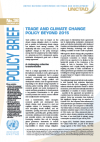Trade and climate change
Featured report: How trade can support climate action: a 2021 agenda for the UK
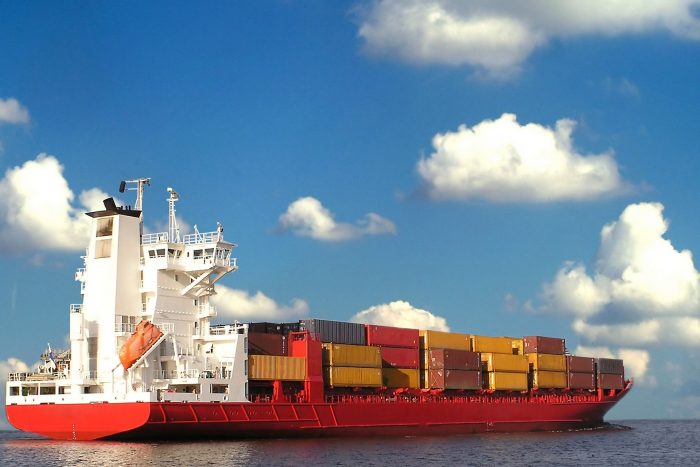
Overview: key trade and climate change issues
In 2017, global carbon dioxide levels are predicted to reach 408 parts per million (ppm), well beyond the 350ppm argued to be a safe limit. Worryingly, carbon dioxide concentrations are increasing at an ever faster rate. As a result, weather patterns are changing, leading to extreme drought in some areas and rainfall in others, with serious implications for human, animal and plant life. In response to the climate crisis, in December 2015 countries negotiated the Paris Agreement - an international and largely non-binding framework for national action to cut emissions.
But binding trade rules govern significant areas of the economy in which countries need the freedom and flexibility to reduce their greenhouse gas emissions. For example, investment protection provisions, either in Bilateral Investment Treaties or chapters in trade deals, can be used as both a sword and a shield to protect and advance investments in fossil fuel extraction, shipping and consumption. Bilateral and plurilateral trade deals like the Trade in Services Agreement (TISA) and the Transatlantic Trade and Investment Partnership (TTIP) seek to establish rules that could influence regulations in all areas of government, including environmental standards
Existing trade rules, agreed at the World Trade Organisation (WTO) or bilaterally, place trade promotion and liberalisation ahead of climate goals and threaten to undermine key climate targets. There are a number of developments (such as the WTO’s trade facilitation agreement) and new deals in the pipeline (such as TTIP and the Environmental Goods Agreement) which could erect further barriers to achieving climate targets. If climate policy is deemed to violate the rules contained in these agreements, governments can face trade sanctions or be required to pay compensation to private companies.
In depth: how trade undermines climate goals
Despite the clear links between the two, climate commitments have been made in isolation from the negotiation of trade deals. Current trade rules place trade promotion and liberalisation ahead of climate goals:
- Investment chapters in trade and investment deals allow companies to sue governments for measures taken to support climate goals, such as the denial of a permit to construct an oil pipeline;
- WTO rules have regularly been used by states to challenge each other’s subsidies to renewable energy industries, yet not one case has been brought against fossil fuel subsidies;
- No trade deal currently in force contains any binding commitments to ensure that international trade supports climate targets.
At the heart of these issues are two fundamental problems with the world trading system. First, it has enshrined the principle that all other policy measures must not unnecessarily restrict or create obstacles to international trade. Second, and in stark contrast with climate agreements, all trade and investment agreements are both fully binding and enforceable.
We urgently need to redesign international trade and investment rules to put them
Tweet this
at the service of climate goals, and we need to do it now – saving the battle for another day will be too late.
Trade and investment deals impede government implementation of climate commitments
Trade and investment deals prohibit a number of measures that governments are likely to need in order to implement climate commitments. For example, they prohibit the use of ‘local content requirements’. This is where a government requires companies to use a certain proportion of local resources such as labour, products or subcontractors. These policies have been used by a number of countries and can be crucial to ensuring domestic support for government measures to support renewable energy programmes, particularly where public money is being invested. However the WTO has ruled against the use of such measures in both Canada and India, and further cases are pending.
Governments often choose to use public procurement rules to support climate measures such as increased use of renewable energy and energy efficiency. Governments might also choose to use tax reductions, preferential lending, cost reimbursements, and other subsidies to incentivize production and use of renewable energy, low-emissions goods such as electric vehicles, and energy efficient goods and services. However these measures have been challenged as ‘creating an unnecessary obstacle to trade’ or as having a discriminatory effect against foreign investors, for example by giving an advantage to domestic producers who might happen to have a greater specialisation in the design or build of electric vehicles.
Many of these measures are challenged through ‘state-to-state’ dispute settlement, often at the WTO. However investment agreements and investment chapters in trade agreements give far-reaching rights to foreign investors, including the ability to sue governments if policies intended to implement climate commitments undermine the profitability of the company’s investment. Energy companies are increasingly using this “investor-state dispute settlement” (ISDS) system to demand compensation against the implementation of climate and environmental policies and to try to prevent the introduction of new policies. For example TransCanada are demanding US$15 billion from the U.S. in response to the rejection of a permit to build the Keystone XL pipeline.
Hinders sharing of green technology
Trade rules include far-reaching intellectual property provisions that threaten to hinder the sharing of green technology. This is particularly the case where stringent patent protections make it prohibitively expensive for developing countries to adopt or adapt new technologies. The WTO Trade Related Aspects of Intellectual Property Rights (TRIPS) agreement is particularly problematic in this respect because it is designed to favour a market mechanism, instead of encouraging broad-based, low-cost dissemination of climate-friendly technologies. In addition, the investment rules contained in current trade pacts restrict policies that require transfer of such technologies or investment in green research and development, even though these are stated goals of the UNFCCC agreement negotiated in Paris.
Trade rules threaten to increase fossil fuel use
Current trade and investment agreements perpetuate global fossil fuel dependency by prohibiting export and import restrictions on fossil fuels, which deprives governments of a tool to limit their production. Trade agreements typically include national treatment for trade in gas, thereby locking in dependency on a fossil fuel with high greenhouse gas emissions, while incentivizing increased fracking and fossil fuel infrastructure. The EU’s own impact assessment of TTIP (the EU-US trade deal) predicts it will generate an additional 11 billion tonnes of CO2 per year.
Reports and Briefings
Towards a fair and strategic trade and climate policy
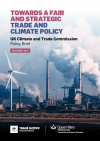
Ten things you should know about Trade and Climate Change
This publication shows the links between trade and climate change in 10 short bullet points.
How trade can support climate action: a 2021 agenda for the UK
This policy briefing outlines how the UK’s approach to tackling climate change could either be helped or hindered by trade rules.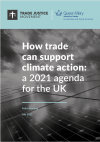
Alternative Trade for the Planet
How to align trade policy with climate and environmental goals.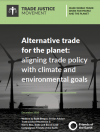
Can trade and investment policy support ambitious climate action?
A report outlining options that could be implemented to tackle climate impacts of trade agreements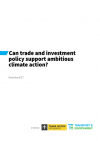
International Trade and Climate Change
This briefing summarises five ways in which trade rules are damaging the climate, and lists potential trade reforms to curb these effects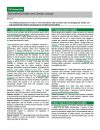
TJM: Take Back the Power - Energy Transition and the International Trade and Investment Regime
Climate goals commit us to reducing fossil fuel use but trade and investment deals can block government action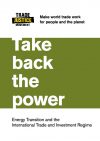
CLIMATE ROADBLOCKS: Looming Trade Deals Threaten Efforts to Keep Fossil Fuels in the Ground
A Sierra Club report, discussing how trade deals make it harder to resist fracking, offshore oil drilling, pipelines and the pollution of pu...
Climate change, trade and emissions leakage: trade measures and climate agreements
A report by the Center for International Environment & Resource Policy into the potential for CO2 commitments to lead to an 'outsourcing' of...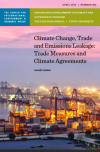
Dirty Deals: How trade talks threaten to undermine EU climate policies
How trade talks threaten to undermine EU climate policies and bring tar sands to Europe
Oil corporations vs. Climate: how investors use trade agreements to undermine climate action
Canadian company TransCanada has announced its plan to sue the US government for more than US$15 billion under the North American Free Trade...
Trade and climate change policy beyond 2015
An UNCTAD briefing exploring the impact of the Sustainable Development Goals and other 2015 changes on trade and climate change mitigation